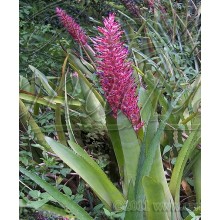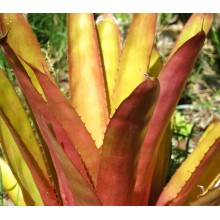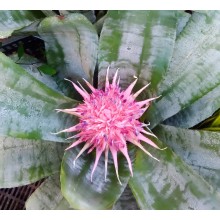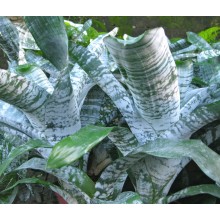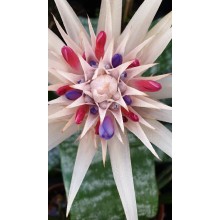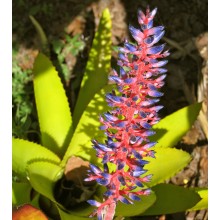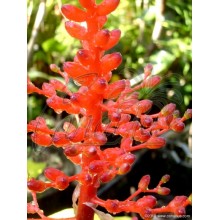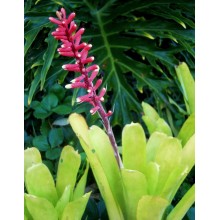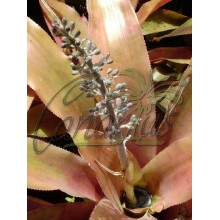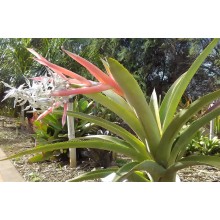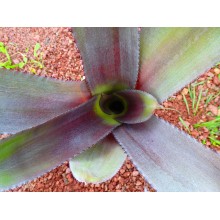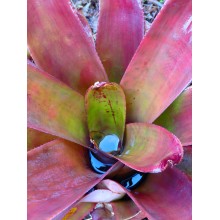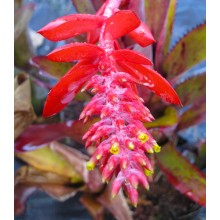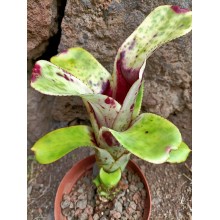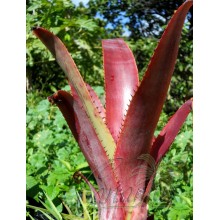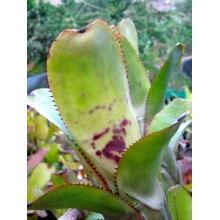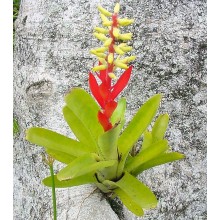Plantas generales Hay 1882 productos.

Si te gustan las plantas exóticas, acabas de llegar al lugar correcto. Canarius ofrece plantas exóticas difíciles de conseguir, que raramente se encuentran en tiendas de jardinería. Nuestra tienda tiene especies naturales, así como híbridos poco frecuentes. Ofrecemos plantas exóticas procedentes de las Islas Canarias.
Los pedidos se envían a cualquier lugar de Europa y también a todo el mundo. Los paquetes llegarán a su casa en pocos días después de ser enviados (tenga en cuenta que también necesitamos algunos días para el procesamiento). No dude en contactar con nosotros si tiene alguna pregunta.
Subcategorías
-
Suculentas
Los desiertos y las áreas secas son el hogar de las plantas más interesantes. Canarius ofrece una selección creciente de plantas suculentas de la máxima calidad, ya que han sido cultivadas al aire libre, bajo el pleno sol de las Islas Canarias.
Las suculentas o "plantas crasas" son especies que retienen agua, que están adaptadas a las condiciones de sequía. Estas plantas almacenan succum (jugo, agua) en sus hojas, tallos o raíces, y con frecuencia muestran un aspecto grueso y carnoso.
-
Exóticas
Las plantas exóticas son especies originarias de otras partes del mundo y que normalmente, tienen un carácter ornamental, una vegetación exuberante, con flores coloridas, formas inusuales... Aquí puede encontrar una gran variedad de plantas exóticas: desde bromelias y heliconias, hasta palmeras y plantas de interior.
Las plantas exóticas no tienen un uso específico. Los coleccionistas compran este tipo de plantas por su rareza, para decoración interior o exterior, en función de sus características. -
Frutales y Medicinales
Los árboles frutales, las hierbas y las plantas medicinales nos permiten mejorar nuestra salud y alimentación. En esta sección, cada tipo de planta tiene efectos saludables, tanto los frutales (Feijoa, piña, Fina de Jete...), como plantas para la salud, como Graviola, Aloe vera, Callisia fragrans...
En el metabolismo normal de todos seres vivos, el organismo produce algunas sustancias a partir de los nutrientes presentes en el entorno; algunos de estos químicos son parte del proceso en todo (o casi todo) tipo de especies. Normalmente, los componentes útiles están concentrados en algunas de sus partes: hojas, semillas, flores...
¡Encuentre su planta saludable y cómprela online!
-
Especiales
En canarius.com tratamos de ir más allá de los límites en el campo de la botánica. En nuestra tienda en línea tratamos de facilitar la compra de plantas de cualquier parte del mundo. Por eso, cultivamos desde las especies más comunes hasta las plantas más especiales, como podrá ver en esta sección.
-
Aechmea distichantha var. schlumbergeri
Aechmea distichantha var. schlumbergeri
NEW ! - Cold-hardy Aechmea found in Bolivia to NE. Argentina. It is a large, spiny plant 50-80 cm tall, producing long-lasting colourful inflorescences in Spring. Great in gardens or in tall pots. Hardy to about -6 C.
22,60 € -
Aechmea distichantha x fulgens discolor
Aechmea distichantha x fulgens discolor
New cold-hardy hybrid with spectacular colours. Leaves are golden to bronze, orange and dark green, the inflorescence is long-lasting.
37,70 € -
Aechmea fasciata
Aechmea fasciata
This particular clone of Aechmea fasciata is a wild-type form with the tipical tiny teeth on the leaf margins. Aechmea fasciata is one of the most popular of all bromeliads. It tolerates a wide range of conditions, including some cold weather. Its large pink inflorescences are a true beauty - only comparable to those of the most tropical, tender types.
12,50 € -
Aechmea fasciata 'Spineless'
Aechmea fasciata 'Spineless'
This is a non-hybrid, almost-spineless selection of this well known beautiful bromeliad. Aechmea fasciata is native to the cool forests in Rio de Janeiro, where it grows between 500 and 1200 m of altitude. It can be grown in pots or mounted.
17,50 € -
Aechmea fasciata 'White Spineless'
Aechmea fasciata 'White Spineless'
This is a non-hybrid, almost-spineless selection of this well known beautiful bromeliad. Aechmea fasciata is native to the cool forests in Rio de Janeiro, where it grows between 500 and 1200 m of altitude. It can be grown in pots or mounted.
19,20 € -
Aechmea fendleri
Aechmea fendleri
An old classic in fine tropical gardening. This mid to large bromeliad has stiff glossy leaves and a very long lasting, bright inflorescence, shimmering in blue and red.
29,30 € -
Aechmea fulgens var. fulgens
Aechmea fulgens var. fulgens
This bromeliad shows the reddest red you can imagine. Flowers and fruits shine during months above the apple green wide foliage.
14,50 € -
Aechmea gamosepala
Aechmea gamosepala
Fast growing mat-forming bromeliad. Small rosettes of pale green leaves produce bright spikes of pink and purple flowers, in the colder winter months. It can take low temperatures with little or no damage at -7 C (20 F) for several hours.
13,20 € -
Aechmea gamosepala var. nivea
Aechmea gamosepala var. nivea
NEW ! - Supreme flowering bromeliad. This variety was described in 1962 from Santa Catarina, in SE Brazil. It is much taller and stouter than the typical A. gamosepala and bears pink-and-white spikes in Spring. Tolerant of moderate cold.
14,00 € -
Aechmea leptantha 'Albo-marginata'
Aechmea leptantha 'Albo-marginata'
Large variegated bromeliad with bold rainbow colours, showing an impressive array of orange, pink, green, yellow and red.
56,00 € -
Aechmea lueddemanniana rubra
Aechmea lueddemanniana rubra
Elegant bromeliad with colourful mottled leaves. It bears a 40-60 cm long spike, with blue flowers. The show lasts for months as it becomes an attractive infructescence with white berries turning purple. Frost sensitive.
24,50 € -
Aechmea maculata
Aechmea maculata
Mid sized bromeliad, with a compact green rosette with thick curly leaves. It blooms in late winter to spring with an amazing inflorescence with pink bracts and yellow flowers.
26,00 € -
Aechmea mcvaughii- Ursulaea mcvaughii
Aechmea mcvaughii- Ursulaea mcvaughii
Ursulaea is a new genus, still uncommon in cultivation. It grows as an Aechmea with a beautiful pink-white fuzzy inflorescence and blue flowers. Leaves are silvery underneath, green if hot and shady and golden-copper in cool sunny weather.
56,80 € -
Aechmea mulfordii 'Malva'
Aechmea mulfordii 'Malva'
This is one of finest clones of the large sized, showy Aechmea mulfordii. 'Malva' has wide and thick silvery-mauve leaves that come in a colour different from most other bromeliads. ... and with the tall yellow inflorescence is an absolute winner!
37,00 € -
Aechmea mulfordii 'Rubra'
Aechmea mulfordii 'Rubra'
This is the true 'Rubra' clone of Aechmea mulfordii, with deep pink to orange tones in the leaves. It becomes a spectacular plant, excellent for landscaping or in outstanding pots.
37,00 € -
Aechmea nudicaulis 'Blumenau'
Aechmea nudicaulis 'Blumenau'
First time offering of a new clone of Aechmea nudicaulis collected on the hills above Blumenau in Southern Brazil. Small sized, compact, with colourful speckled leaves with rounded tips.
28,00 € -
Aechmea nudicaulis 'Viñales'
Aechmea nudicaulis 'Viñales'
Upright Northern form of Aechmea nudicaulis, with tapering leaftips, often curly. Leaves turn purple-reddish in the cooler or drier months. It is robust and grows a bit larger than other nudicaulis.
18,30 € -
Aechmea nudicaulis green
Aechmea nudicaulis green
NEW;Aechmea nudicaulis is a Bromeliad species in the genus Aechmea, which is often used as an ornamental plant. This species is native to Central America, the West Indies, central and southern Mexico, and northern and central South America.
16,70 €
En estos momentos tenemos pocos productos en esta categoría Plantas generales




















